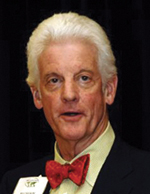A Vienna Convergence

William Neukom.
Photo by Stars and Pictures
GMBH/Curt Themessl
It is far too soon to divine the ultimate legacy of the three-day World Justice Forum that wrapped up July 5 in Vienna, Austria. But ABA President William H. Neukom, founder of the World Justice Project that conducted the forum, assured some 500 attendees that their short-term accomplishments were impressive.
“We achieved a great deal during these three days,” said Neukom, “starting with the fact that this number of people came to Vienna because they believe in the premise that we can do so much more if we create communities committed to the rule law as a way to create societies of opportunity and equity.”
Neukom, a partner at K&L Gates in Seattle, cited other important gains made by the gathering of representatives from 95 countries and 15 professional disciplines.
TAKING STOCK OF WHAT WAS ACCOMPLISHED
First, Neukom said, was the consensus reached on key principles that express the meaning of the rule of law.
Second, he said, was a shared understanding that the purpose of the rule of law is to help create communities of equity and opportunity for their citizens.
Third, research papers produced by two teams of scholars—released in draft versions at the forum—illustrated how the rule of law contributes to political, economic and social development, and explored the access-to-justice issues facing marginalized groups in various societies.
Neukom also cited more than 30 specific project goals presented on the last day of the gathering; they had been developed in breakout sessions by regional teams of forum participants. The projects, which will be carried out by groups in each region, may seek financial support from a $240,000 fund created by the Oak Foundation in London.
Another key development at the forum was the release of an initial report affirming the viability of the Rule of Law Index as a process for measuring how effectively countries adhere to rule of law principles in a number of key areas. A full report on the findings will be released later this year, said Mark D. Agrast, who coordinated development of the index.
Agrast said that within three years, the project is expected to cover some 100 nations. But he cautioned against any temptation to treat the index as a vehicle for rating countries on their adherence to the rule of law.
“This is a diagnostic tool; it’s not a grading system,” said Agrast, a senior fellow at the Center for American Progress in Washington, D.C.
There were notes of caution, however, that achieving the forum’s goals won’t be quick or easy. Session participants often struggled to reconcile rule of law principles in the context of different cultures and power structures likely to resist change.
Other participants emphasized that advancing the rule of law ultimately involves changing equations of political and economic power.
“The system in which wealth is created and distributed—after all, that’s what this is all about,” said John Bohn of San Francisco, a member of the California Public Utilities Commission who has a background in international economic development. The reality is, he said, “the poor always get screwed.”
Despite concerns, however, the forum received high grades from attendees.
“My background is not in the legal profession, and this conference opened my eyes to the importance of the rule of law,” said Moses Kachima, executive secretary of the Southern Africa Trade Union Coordination Council in Gaborone, Botswana. “But the task now is for all of us to take the message of its importance home to our constituencies.”
A statement of the rule of law principles is on the project’s website: worldjusticeproject.org.



